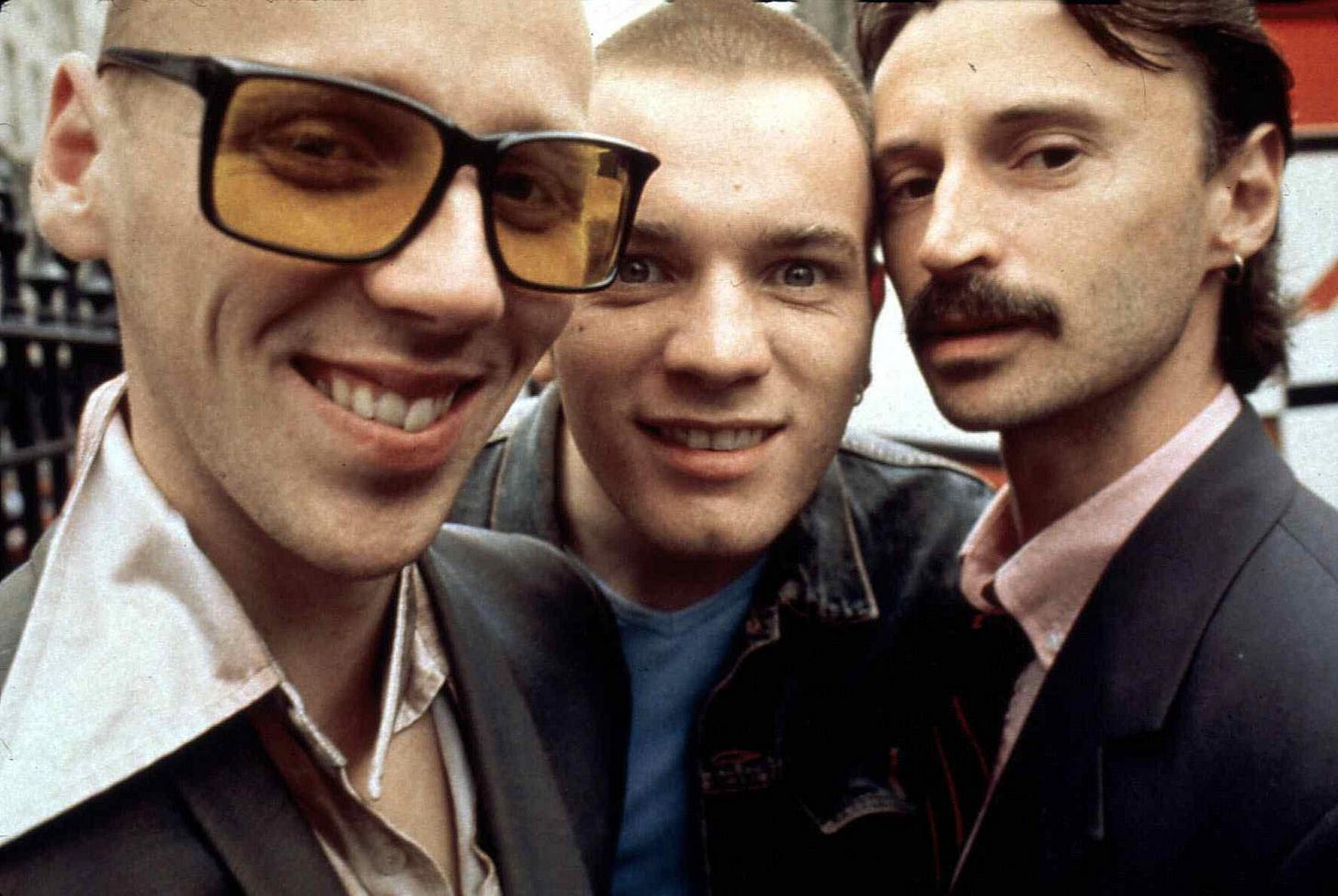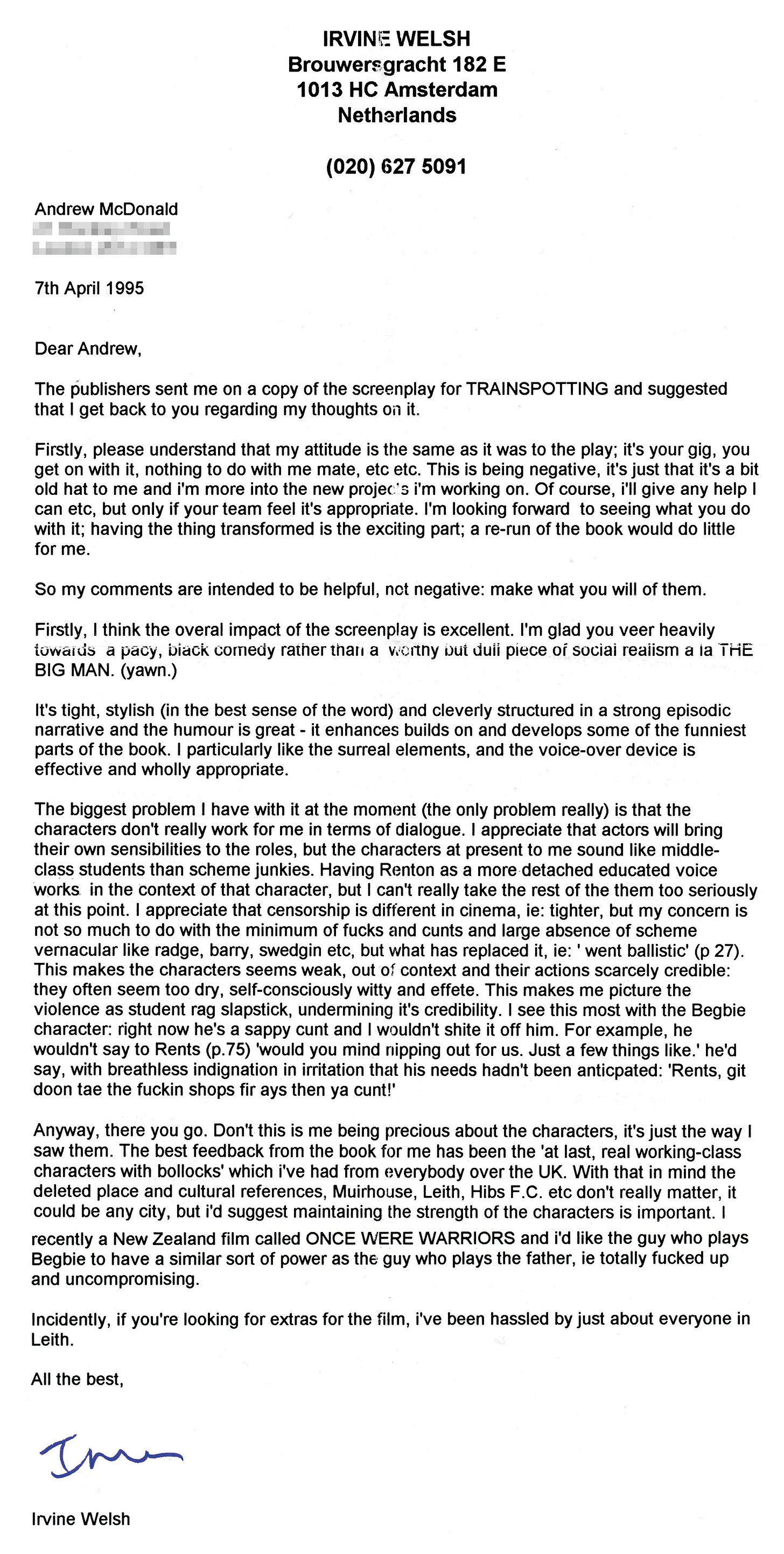Rents, git doon tae the f*ckin shops fir ays then ya c*nt!
Irvine Welsh reacts to the Trainspotting screenplay
The following letter is about Trainspotting (the film, not the hobby), and as such contains expletives—so if you’re opposed to that sort of thing, maybe give it a miss, or just hold tight.
When released in 1996, Trainspotting garnered immediate acclaim from critics and audiences alike, with its stark depiction of addiction and poverty in 1980s Edinburgh striking a cultural chord. The film, an adaptation of Irvine Welsh’s eponymous novel, owed its success to several key components: a stellar cast that brought their roles vividly to life, Danny Boyle’s daring direction that captured the spirit of the story, an unforgettable soundtrack that resonated with the era, and John Hodge’s perfectly adapted screenplay. About a year before the film’s premiere, with shooting soon to begin, a draft of that screenplay was forwarded to Welsh for review. He responded to producer Andrew McDonald by letter.
(Keep scrolling for a transcript.)
7th April 1995
Dear Andrew,
The publishers sent me on a copy of the screenplay for TRAINSPOTTING and suggested that I get back to you regarding my thoughts on it.
Firstly, please understand that my attitude is the same as it was to the play; it's your gig, you get on with it, nothing to do with me mate, etc etc. This is being negative, it's just that it's a bit old hat to me and i'm more into the new projects i'm working on. Of course, i'll give any help I can etc, but only if your team feel it's appropriate. I'm looking forward to seeing what you do with it; having the thing transformed is the exciting part; a re-run of the book would do little for me.
So my comments are intended to be helpful, not negative: make what you will of them.
Firstly, I think the overal impact of the screenplay is excellent. I'm glad you veer heavily towards a pacy, black comedy rather than a worthy but dull piece of social realism a la THE BIG MAN. (yawn.)
It's tight, stylish (in the best sense of the word) and cleverly structured in a strong episodic narrative and the humour is great - it enhances, builds on and develops some of the funniest parts of the book. I particularly like the surreal elements, and the voice-over device is effective and wholly appropriate.
The biggest problem I have with it at the moment (the only problem really) is that the characters don't really work for me in terms of dialogue. I appreciate that actors will bring their own sensibilities to the roles, but the characters at present to me sound [more] like middleclass students than scheme junkies. Having Renton as a more detached educated voice works in the context of that character, but I can't really take the rest of the them too seriously at this point. I appreciate that censorship is different in cinema, ie: tighter, but my concern is not so much to do with the minimum of fucks and cunts and large absence of scheme vernacular like radge, barry, swedgin etc, but what has replaced it, ie: ' went ballistic' (p 27).
This makes the characters seems weak, out of context and their actions scarcely credible: they often seem too dry, self-consciously witty and effete. This makes me picture the violence as student rag slapstick, undermining its credibility. I see this most with the Begbie character: right now he's a sappy cunt and I wouldn't shite it off him. For example, he wouldn't say to Rents (p.75) 'would you mind nipping out for us. Just a few things like.' he'd say, with breathless indignation in irritation that his needs hadn't been anticpated: 'Rents, git doon tae the fuckin shops fir ays then ya cunt!'
Anyway, there you go. Don't [think] this is me being precious about the characters, it's just the way I saw them. The best feedback from the book for me has been the 'at last, real working-class characters with bollocks' which i've had from everybody over the UK. With that in mind the deleted place and cultural references, Muirhouse, Leith, Hibs F.C. etc don't really matter, it could be any city, but i'd suggest maintaining the strength of the characters is important. I recently [watched] a New Zealand film called ONCE WERE WARRIORS and I’d like the guy who plays Begbie to have a similar sort of power as the guy who plays the father, ie totally fucked up and uncompromising.
Incidently, if you're looking for extras for the film, I've been hassled by just about everyone in Leith.
All the best,
Irvine Welsh
This letter can be found in the brilliant book, Trainspotting: The 25th Anniversary, by Jay Glennie, published by Coattail Publications.





As someone who has lived in Leith that last sentence did not at all surprise me. Brilliant.
I'm laughing because I once delivered 42 pages of notes for another writer's screenplay adapted from my book. Roddy Doyle is far more kind than I was.